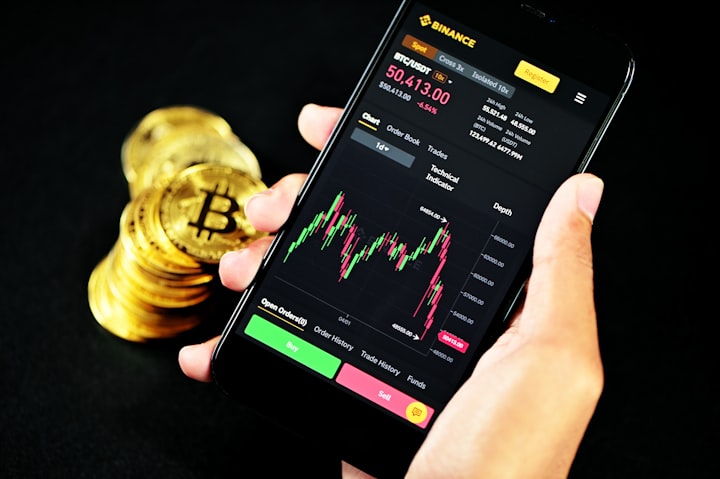What Are Decentralized Finances [DeFi]?
Banks are not happy with this but… that’s life.
![What Are Decentralized Finances [DeFi]? What Are Decentralized Finances [DeFi]?](https://images.unsplash.com/photo-1617330107595-3c049b5ef565?fit=max&fm=jpg&ixid=MnwzNTY3MHwwfDF8YWxsfHx8fHx8fHx8MTYzODQ1MjAzNg&ixlib=rb-1.2.1&q=75&w=720&utm_medium=referral&utm_source=vocal.media)
DeFi or Decentralized Finance is an ecosystem composed of different protocols or DApps [Decentralized Applications], don’t worry I will talk about them in another article, that allows you to access financial services such as loans, savings accounts, exchanges, and more. In short, they are peer-to-peer financial services that run in a blockchain. Interaction with DeFi is usually done through dapps (“decentralized applications”).
Unlike banks and centralized finance, there is no need to fill out applications or open an account, and so on.
Let me explain this with an example:
Imagine that we live in a world without Covid-19, there’s no Omicron in our way. So, you’re going to spend your Holidays in Paris, and suddenly you need $5k. You call your bank in the U.S. and ask for those $5k.
The bank verifies your account and responds: “Ain’t gonna happen, mate”.
Hold on, let me try again.
Actually, it would be something like “I’m sorry Mrs [or Sr], we can’t lend you more than $2k at the moment and it will take between 5 to 7 working days to have the money in your account.”
But you really need the money to get back home before New Years’ Eve. “If at least someone could lend me the money faster than then 5 working days, making a contract agreeing on the conditions”, you might be thinking.
Here’s where DeFi comes in.
With the Ethereum blockchain, you can access anyone around the world willing to lend you money. You agree on the terms and conditions with the borrower using a Smart Contract [I will explain it too in another story]. After you get the amount of money you needed in ETH, you can easily exchange it for dollars or euros, and withdraw it from your account. The best part? It works 24/7 and you don’t need to way 5 working days to get the money.
But DeFi is not just about lending money.
Here you have the most common use cases of DeFi nowadays:
Lend Crypto: Earn interest every minute, not once a month and with higher rates
Get a loan: Instant loans without paperwork, including “rush loans” that don’t exist in CeFi [centralized finance]
Trading: transactions between crypto pairs, buying and selling shares without intermediaries.
Saving for the future: Alternatives to savings accounts with better interest rates than a bank.
There are applications that focus on developing financial services using cryptocurrencies. From loans and payments, without the need to give your personal information. Let’s take a look at some of them:
Savings accounts and loans
Aave: Lend your tokens to earn interest, you can withdraw them at any time.
Compound: Lend your tokens to earn interest, you can withdraw them at any time.
Oasis: Trade, borrow, and save with DAI, an Ethereum stablecoin.
Token exchange
Uniswap: Change your tokens with ease. A UNISWAP community allows you to exchange tokens with people across the network.
1inch: Change your tokens with ease. 1inch helps you avoid a high price change by adding the best prices.
Matcha: Change your tokens with ease. Searches multiple exchanges to help find you the best prices. Matcha Searches various DEXs to help you find the best prices.
Predictions Market
Polymarket: Bet on the results. Trade in the information markets.
Augur: Bet, and invest in the results of sports, the economy, and more world events.
Loopring: A peer-to-peer trading platform built for speed transactions.
dYdX: Open short or leveraged positions with up to 10x. Loans and credits are available too.
Payments
Tornado Cash: Submit anonymous transactions on Ethereum. A completely decentralized protocol for private transactions on Ethereum.
Sablier: Protocol for real-time finance on the Ethereum Blockchain. Transfer money in real-time.
Insurances
Nexus Mutual: Coverage without the insurance company. Protect yourself against smart contract bugs and hacks. Decentralized coverage.
Etherisc: A decentralized insurance template that anyone can use to create their own insurance coverage.
Derivatives
Exchange houses or decentralized exchanges (DEX) allow you to make exchanges without losing custody of your cryptocurrencies. This eliminates the need to send your cryptocurrencies to a centralized exchange. Here all the exchange of cryptocurrencies happens through smart contracts that cannot be turned off or manipulated. Interaction with these exchanges is directly from your non-custodial wallet. Some examples are Aave, Compound, and Synthetix.
Interest Accounts
Interest accounts allow you to receive interest on your deposited money, this allows you to generate income on your cryptocurrencies in a fairly simple way.
The interests come out of the people who ask for loans and leave their collateral. Your borrowed money is insured for the value of the collateral left by the debtors, in case of non-payment it is sold to cover costs. Some examples are Kyber Network, Uniswap, and 1inch.
Trading
Interest accounts allow you to receive interest on your deposited money, this allows you to generate income on your cryptocurrencies in a fairly simple way.
The interests come out of the people who ask for loans and leave their collateral. Your borrowed money is insured for the value of the collateral left by the debtors, in case of non-payment it is sold to cover costs.
Conclusions
The big vision behind DeFi is to make financial services more accessible to the 1.7 billion people around the globe with no access to Banks or financial services.
“In order to promote the economic growth of the nation, it is necessary to authorize the circulation of a digital currency whose value answers exclusively to free-market criteria, in order to increase national wealth for the benefit of the greatest number of inhabitants,” — Nayib Bukele [President of El Salvador].
The best successful case in the history of the implementation of DeFi is El Salvador, being the first country in the world to adopt a cryptocurrency (Bitcoin in particular) as legal tender.
----------------------------------------------------------------------------------------
Disclaimer: This article is for informational purposes only. It should not be considered Financial or Legal Advice. Not all information will be accurate. Consult a financial professional before making any major financial decisions.
This article was published first on Medium by the same author.
About the Creator
Juan Cienfuegos
Host of BitCorner 🎙️The 1st Salvadoran Bitcoin Podcast | Author of The Savior: #Bitcoin 🇸🇻⚡️ | engineer + educator






Comments
There are no comments for this story
Be the first to respond and start the conversation.